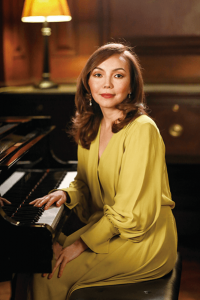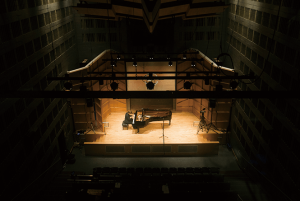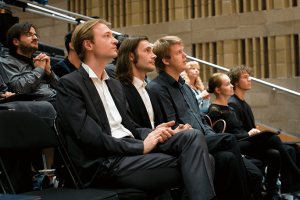Special Program
Elevating Spirits With Traditional Music
A New Program Called ‘Piano Talks’ With Janara Khassenova
Dec 15, 2020
By Masha Savitz

Janara Khassenova at the piano in New York City.
(Photo by Samira Bouaou)
Courtesy of Elite Lifestyle Magazine
“The arts and music are things that bring people good intentions,” says celebrated pianist Janara Khassenova. “When you go to the concert hall and listen to music, you know you’re going to be faced with something beautiful, or something beyond this ordinary life.”
Khassenova has spent her life creating such experiences for audience members around the world, and teaching others to do the same. Based in New York, she is a faculty member of the Bard College Conservatory of Music’s Preparatory Division, and collaborates with various musicians on a plethora of projects.
This year, as a result of the global pandemic, access to live music has vanished, and anxiety levels have risen. The situation prompted the acclaimed musician to join forces with NTD, a multilingual American television broadcaster and supporter of traditional arts programs. Together, they’ve designed a new TV program they hope will act as a salve for our bereft souls.
Piano Talks is a new series inspired by NTD’s world-class International Piano Competition. Khassenova has been NTD’s artistic advisor and jury member of the International Piano Competition since 2016. Now, NTD is reaching into its archives, reaching back in time to when much of the great music was born, and is bringing Khassenova into the spotlight as host.

The 2016 NTD International Piano Competition. Since 2008, the competition’s mission has been to promote artistic excellence and the 250-year legacy of classical piano literature. (Photo by Samira Bouaou)
Piano Talks presents an intimate experience with classical music while offering erudite yet accessible insights into the work and the composers.. Its mission is to elevate the viewer through promoting the traditional arts, and to bring back the glory of masterful piano pieces to show the beauty of the music.
Elite recently interviewed Khassenova about her new endeavor and her musical journey.
“This program mainly represents works by the old masters, composers like Bach, Beethoven, Chopin, and Rachmaninoff. We realized that NTD has an incredible archive from the NTD International Piano Competitions, featuring very great musicians from all around the world.”
Those behind the show, including Khassenova, believe this show is especially important at this moment in history.
“It’s been quite a difficult time,” Khassenova explains. “People are feeling very frustrated, even fearful about what’s next, what we’re going to do, and how long they are going to be able to continue with nowhere to go and little opportunity for meaningful interaction. Music and the arts in general are a kind of a relief for audiences who are seeking a certain state of mind, something consoling, something to entertain and to calm them.”

Contestants at the 2016 NTD International Piano Competition. Pianists from dozens of countries around the world came to New York City for the competition. (Photo by Samira Bouaou)
Khassenova said she’s delighted to talk about the great masterpieces and all of her fond memories of the competition. The TV program overlaps with the mission of the competition, she says, “to preserve the classical repertoire, the music itself, and that traditional way of composing.”
But although Piano Talks primarily focuses on earlier classical works, it also highlights outstanding compositions from today, including an original piece written specifically for the piano competition.
NTD’s piano competition includes three rounds, including preliminaries where participant pianists show their talent over three days, playing repertoires from predominantly the Baroque, Classical, and Romantic eras. They’re also required to learn and play a new music piece—a Commissioned Composition.
Written especially for the competition and to be featured in a future episode of Piano Talks, the piece was arranged for piano by composer Susan Liu. It was based on original melodies written by Mr. D. F., the Artistic Director of Shen Yun Performing Arts.
This innovative commissioned work comes from traditional Chinese music, but it is blended into the Western style, Khassenova explains: “So it is difficult for the musicians to play. By watching them playing, you can see how they, as artists, understand it, how quickly they can respond and learn it under the pressure of the competition.”
Khassenova seems to revel in this aspect of the competition, the personal touch each participant brings to that one new piece of music. She says it’s incredible to see their personalities through music. “Westerners, or musicians from different parts of the world, play through their own understanding. It’s a cultural thing that all the music you play, you need to feel it inside, and then you bring it outside.”
Khassenova understands the nuances of cultural differences well. Originally from Kazakhstan, she is a graduate of the Moscow State Conservatory where she completed postgraduate studies. While in the United States, she completed an Artist Diploma Program in Piano Performance from the Longy School of Music. She has performed as a soloist and with chamber ensembles and orchestras in countries from the former Soviet Union to Italy and Greece as well as the USA.
Khassenova described her background growing up in the country of Kazakhstan: “The house of the average family would be full of books, albums, and artworks. For highly educated parents like mine, they knew that arts and music in general are very important for education.”
Recognizing their daughter’s aptitude for music, her parents sent her to a special music school for gifted children.
“It was quite stressful for kids because the entrance exam was based on competition again. You knew that this was your profession—becoming a musician—when you were age 6.”
“Later, when I came to the U.S., I was often asked, what do you do? When I told people I’m a musician they still asked, how do you make a living? So for Americans it wasn’t understandable that being a musician is a profession rather than a hobby. But for us, musicians are the elite class of the society and the privileged niche.”
Khassenova says Russian training in music teaches excellent technical skills, but also a sensitivity and deep understanding for the music itself. Russian training sets a master apart from someone who is simply a good musician. She explains the type of foundation provided by the Russian school, whose influence is far-reaching.
“First of all, it has roots—very deep and historical roots that have been established for such a long time. We had to immerse ourselves into different vaults of sounds. It meant that you had to know the story behind the composition and express your interpretation of it.”
Khassenova’s ability to convey meaningful stories runs deep. Talking about finding a serene place for her morning meditation practice, she says, “We live in the fast-paced society of New York. The pace of life is different right now, but something stays eternal. I’m talking about the things you can find within yourself—the inner peace, being able to find wisdom. It’s one of the greatest ways of spending my free time besides my busy life of teaching, performing, and being a mother.”
This depth, understanding, and passion for the music and its composers, is what Khassenova brings to her students, to her audiences, and to viewers of Piano Talks. We are all enriched by the experience.
